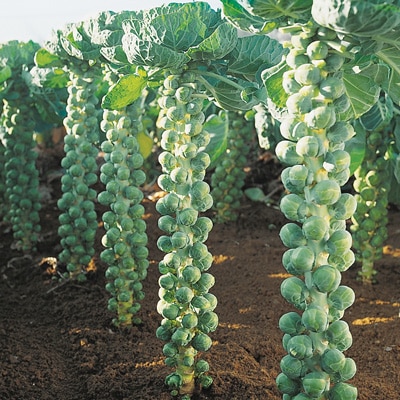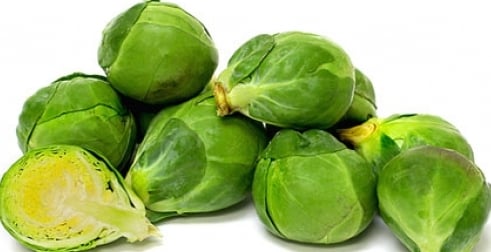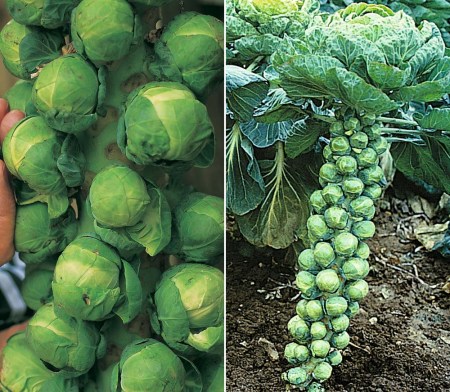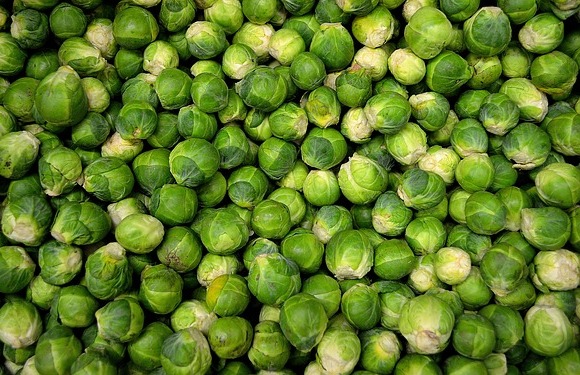Brussels Sprout Cultivation Guide:

Introduction of Brussels sprout Cultivation:- This is one of the important cold vegetable crop cultivated in Jammu Kashmir, Himachal Pradesh, hilly regions of Uttar Pradesh, Maharashtra, Tamil Nadu. This vegetable is mostly cultivated in USA and European countries. Brussels sprouts belong to the family of “Brassicaceae” and genus of “Brassica”. The sprouts growing on axils of leaves are used for cooking and salad purpose. The Brussels sprouts have good health benefits and are rich in vitamins and minerals. This vegetable resembles mini cabbage.
Major Production States of Brussels sprout in India:- Himachal Pradesh, Jammu & Kashmir, Uttar Pradesh, Nilgiri of Tamil Nadu and Maharashtra.
Health Benefits of Brussels Sprouts:- The following are the health benefits of Brussels sprouts.
- Brussels sprouts help in weight management.
- Brussels sprouts are good source of fiber.
- Brussels sprouts are good source of anti-oxidants.
- Brussels sprouts are good source of vitamin ‘C’.
- Brussels sprouts can help lower cholesterol.
- When combined with whole grains, Brussels sprouts make a complete protein.
- Brussels sprouts may fight with cancer cells.

Varieties of Brussels sprout:– The varieties of Brussels sprout is grouped in to tall, medium-tall and dwarf. The tall varieties reach about 75 cm height and medium-tall varieties reach about 55 to 60 cm where as dwarf varieties reach up to 40 to 50 cm.
- Rubine: This variety is a high yielding variety.
- Hilds Ideal: This variety plants are medium-tall and bear about 50 sprouts measuring 75 to 80 cm across. These green and compact sprouts weigh 7 to 8 grams. A single plant can produce 200 to 400 sprouts giving an average yield of 100 to 150 quintals per ha.
- Jade Cross: This variety is short-stemmed early and high yielding Japanese F1 hybrid. This variety of Brussels sprout is suitable for single harvest.
Climate and Soil Requirements for Brussels sprout Cultivation:- Brussels sprouts grows well best in cold and humid climates. The ideal temperature of 15 °C to 25 °C is best for its cultivation. However, good quality sprouts will be obtained with the temperature range 1 °C to 20 °C. This vegetable requires longer growing periods when compared to cabbage.It does not produce quality sprouts in high temperature conditions.
Brussels sprouts can be grown on wide variety of soils. However, they grow best in sandy loam soils. Soils having good drainage and organic matter with pH value of 6.0 to 7.0 is ideal for its production.
Propagation in Brussels sprout Cultivation:- Brussels sprouts are mainly propagated through seeds. However, they also can be propagated by vegetative propagation (by cuttings) and tissue culture.
Land Preparation in Brussels sprout Cultivation:- The main field should be thoroughly prepared by giving 5 to 6 ploughings and make it friable. The land should be levelled and make it weed free from previous crops. Prepare small beds size of 3 meter x 3 meter (or) 4 meters x 4 meters.

Seed Rate and Sowing in Brussels sprout Cultivation:- Seed rate of 500 grams per ha land should be more than enough to raise the seedlings. Seeds should be sown on raised nursery beds from Aug to Oct in plains and Feb to Apr in hills. Nursery beds should be drenched with Captan or Brassicol 3 grams/liter before sowing. These beds should be covered with alkathene sheet for 4 days. Thereafter, the seeds should be sown in lines 5 to 7 cm apart at a depth of 1.5 to 2 cm. Make sure to cover the seeds with fine soil and mulching with hay should be carried to cover the nursery immediately after sowing. Usually, germination of seeds takes about 4 to 5 days under temperate conditions. Carry out frequent irrigation for smooth germination and growth of young seedlings. The seedlings will be ready in 35 to 45 days for transplanting in the main field.
A spacing of 60 cm x 45 cm should be kept between and within the rows. The spacing can be increased or decreased depending on the variety of Brussels sprout and soil type. Generally, the seedling about 12 to 15 cm tall should be used for transplanting in the land.
Irrigation in Brussels sprout Cultivation:- Carry out the first irrigation immediately after transplanting the seedlings for better root settlement in the soil. Thereafter subsequent irrigations should be given based on weather conditions and usually @ 2 weeks interval. At the time maturity of sprouts, avoid irrigation to prevent the loosening of sprouts.
Inter-Culture Operations in Brussels sprout Cultivation:- Hoeing and weeding should be carried just like in any other vegetable crops. An earthing-up should be carried before sprout formation. Hoeing and weeding should be stopped when foliage covers the soil. Chemical weed control Basalin @ 0.5 liter/ha can be applied to control the weeds. Polythene mulch can be used to check the weed growth around the plants.
Manures and Fertilizers in Brussels sprout Cultivation:- A balanced application of fertilizers should be applied for good quality of sprouts and yield. Supplementing with 25 tonnes of farm yard manure is recommended during the land preparation. The N: P: K of 200:100:100 kg/ha should be applied. One third of ‘N’ and the full dose of ‘P’ & ‘K’ should be applied before transplanting the seedlings. The remaining dose of ‘N’ should be applied as top-dressing around the plants in two equal split doses. The 2nd dose of ‘N’ should be applied 30 to 45 days after planting and 3rd dose before formation of the sprouts.
Harvesting in Brussels sprout Cultivation:- The sprouts can be harvested when they attain max size and compactness. It is very important to harvest in right time. Usually, 4 to 6 harvestings can be carried.

Yield in Brussels sprout Cultivation:- Yield of any crop depends on variety and farm management practices. In first or single harvesting, 40 to 50 quintals/ha can be expected. In subsequent harvestings 100 to 125 quintals/ha can be expected.
Post harvesting Tasks in Brussels sprout Cultivation:- The harvested sprouts can be graded and packed in baskets and sent them to markets immediately.
For Sheep or Goat Farming: Read here.
For Asia Farming: Read here.